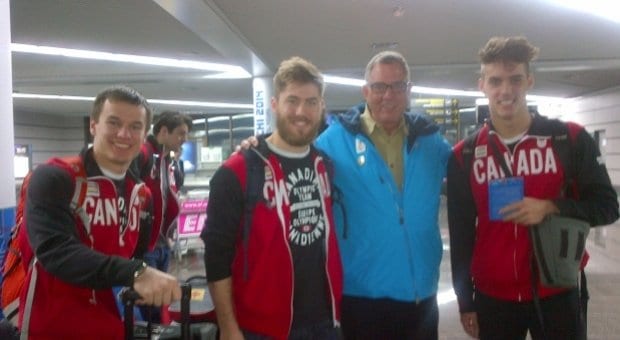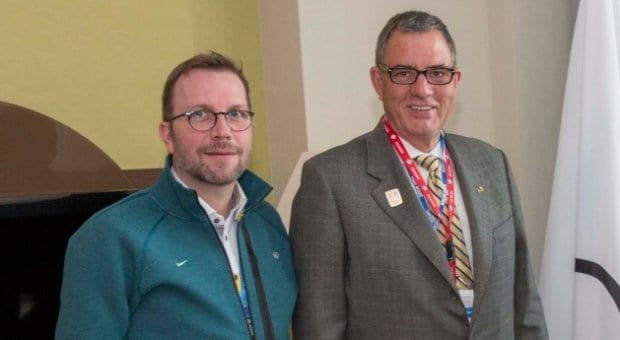
Councillor Tim Stevenson poses in Sochi with members of the Canadian men’s luge team who, he says, were very supportive of his mission. Credit: Courtesy of Tim Stevenson
Update Feb 14:
In an email to Xtra dated Feb 14, IOC communications director Mark Adams confirms that “the IOC is currently going through a fundamental process under its new president looking at all aspects of the Games.”
“We have asked all stakeholders and the general public to contribute and every subject is open for debate,” he says.
“Should there be a majority in favour of such a change [adding sexual orientation to the charter] it would be possible,” he continues.
However, Adams reiterates that the IOC believes its charter already prohibits discrimination based on sexual orientation.
“We have always made it very clear that we consider that the current wording forbids any discrimination. And we have stated many times that this absolutely includes on grounds of sexual orientation,” he says. “Indeed we have repeatedly asked for reassurances that no such discrimination would occur during the Games towards any participant from spectators to athletes.”
Although Adams says the IOC is now willing to consider changing the wording of the charter to explicitly add sexual orientation, he insists that such a change “would have no effect on the actual behaviour of the IOC since we already consider any form of discrimination on grounds of sexual preference to be against the Charter.”
***
Feb 13:
The International Olympic Committee (IOC) is poised to review its charter and implement significant changes to protect gay athletes, according to Vancouver Councillor Tim Stevenson.
“The president [of the IOC] decided that the IOC needed to go in a new direction,” says Stevenson, who is gay.
Leveraging Vancouver and Whistler’s position as past host Olympic city, and representing Vancouver as deputy mayor, Stevenson travelled to Sochi Jan 28 to lobby the IOC to explicitly protect gay athletes and make the inclusion of Pride Houses mandatory in host-city bids.
Stevenson says top ranking IOC officials told him that a “comprehensive review” is now underway and is expected to be complete by December 2014.
“This is a huge organization, and it’s a massive change in a short period of time,” Stevenson says.
Xtra’s request to speak to someone at the IOC about changes to its charter was unsuccessful, but an emailed response reiterates the organization’s commitment to discrimination-free sports.
“The IOC is clear that sport is a human right and should be available to all regardless of race, sex or sexual orientation as stated in the Olympic Charter. The Games themselves should be open to all, free of discrimination, and that applies to spectators, officials, media, and, of course, athletes,” the email says. “We would oppose in the strongest terms any move that would jeopardise this principle.”
At a press conference on Feb 3, IOC president Thomas Bach hinted at possible change but said the charter already protects participants from discrimination on the basis of sexual orientation. “Whether you name it expressly or not is more symbolic an issue,” he said. “It doesn’t change the legal quality.”
The IOC charter currently says discrimination “on grounds of race, religion, politics, gender or other” is “incompatible” with the Olympic movement.
Stevenson says the IOC previously felt that its charter included sexual orientation in its reference to “other” grounds of prohibited discrimination but now realizes that reference is not enough.
“So they’re reconsidering the entire charter,” he claims.
“They reiterated it at least a half dozen times that sexual orientation would be part of the review,” he says.
“The president [of the IOC] couldn’t meet with us, but he didn’t ask just anyone to meet with us — he asked his top people,” he adds.
Stevenson says he had a 90-minute meeting with IOC chief of staff Jochen Farber and IOC communications director Mark Adams on Feb 3. “They talked with us until we were finished talking,” he says. “There was no time limit whatsoever. They were completely open. They were very interested in listening, they took notes, heard our presentation, and at the end they said they completely understood.”
Stevenson says the IOC also recognized and understood the need for Pride Houses.
“They were very supportive of Pride House,” he says. “They’ll do what they can, but they don’t want to control [the Pride Houses]. They think it’s best if the community does it.”
Vancouver West End MLA Spencer Chandra Herbert, who wrote a guest column on why he’s saying nyet to the Sochi Games, says he’ll believe the IOC changes when he sees them.
“I’m in support of Tim’s efforts, but I don’t think the Games should have been awarded to Russia because of their hateful and homophobic laws,” he says.
“I think getting the charter changed is a good thing; however, we can’t forget that the Paralympic Games always had sexual orientation in the charter and the Games are still being held in Russia,” he says. “How the heck did they ever agree to hold the Paralympics in Russia? It doesn’t work.”
Stevenson calls Chandra Herbert’s view “naive” and suggests that he talk to the paralympians and Russian people. “It won’t help the community in Russia to boycott [the Olympics],” Stevenson says. He says he talked with local Russian gay groups who opposed a boycott.
Chandra Herbert maintains that his decision to boycott watching the Games is a “moral choice.”
“I’m not watching. I can’t bear to bring myself to do that given the pain and suffering that the Russian gay community is facing outside of the Olympics,” he says.
“So far, the IOC’s actions have dictated that their words don’t mean anything,” he adds. “Hopefully, [the changes] mean more than words on paper.”
“These aren’t just words on paper; this is huge,” Stevenson counters.
The IOC is moving quickly for a large international organization, he says, adding that this is a key moment for change and there’s reason for optimism.
Stevenson credits the efforts and solidarity of the gay community worldwide for pushing the IOC to amend its charter.
“It’s because of our community in large measure,” he says. “The GLBT community around the world needs to take credit for the changing of the IOC’s direction.”

 Why you can trust Xtra
Why you can trust Xtra


